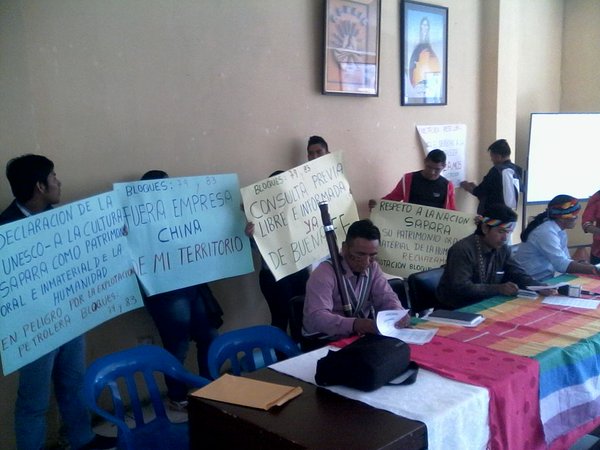






Washington D.C., January 28th, 2016.- The Center for Justice and International Law (CEJIL) denounces Ecuador’s decision to grant two land blocks located on indigenous territory for oil exploration, thereby putting inhabitants’ cultural identity and ancestral lands at risk.
On January 14, 2016, the Coordinating Minister for Strategic Sectors, Rafael Poveda, announced the signing of a contract permitting the exploration and exploitation of oil blocks 79 and 83, located in the Amazon province of Pastaza, in eastern Ecuador.
The agreement was signed on Monday, January 25th, and allows China National Petroleum Corporation (CNPC) and China Petrochemical Corporation (Sinopec), both of which belong to the Andes Petroleum consortium, to carry out prospecting projects over the next four years. Additionally, a new round of oil bidding in the south of the Amazon will begin this year –on lands belonging to seven indigenous nationalities.
Given these new developments, we would like to point out that the concession of blocks 79 and 83 will affect about six thousand hectares of territory belonging to the Kichwa people of Sarayaku. This concession was made without any consultation in accordance with international standards.
Following a prior unconsented land grant in 1996 to Argentine oil company GCC—and subsequent unauthorized incursions— the Inter-American Court of Human Rights issued a judgment in 2012 that explicitly outlined the State’s obligation to perform prior consultation before any project affecting indigenous territories, in accordance to international standards. To date, these processes have not been fully developed.
Moreover, during the UN Conference on Climate Change in Paris, the State announced its international commitment to “protecting nature” through the creation of an International Court of Environmental Justice. But the recently signed agreement with Andes Petroleum demonstrates how such statements, made in the diplomatic arena, do not translate into concrete action within the country.
Finally, given the lack of prior, free and informed consultation in accordance with national and international standards, the contract with Andes Petroleum runs the risk of not being covered by international investment protection mechanisms.
CEJIL condemns Ecuador’s decision of re-licensing exploration and exploitation in indigenous territories. We demand that the State, both in policy and in practice, ensure consultation processes are carried out in accordance with international standards.
Help us continue this critical and urgent work with a donation!
DONATE NOW